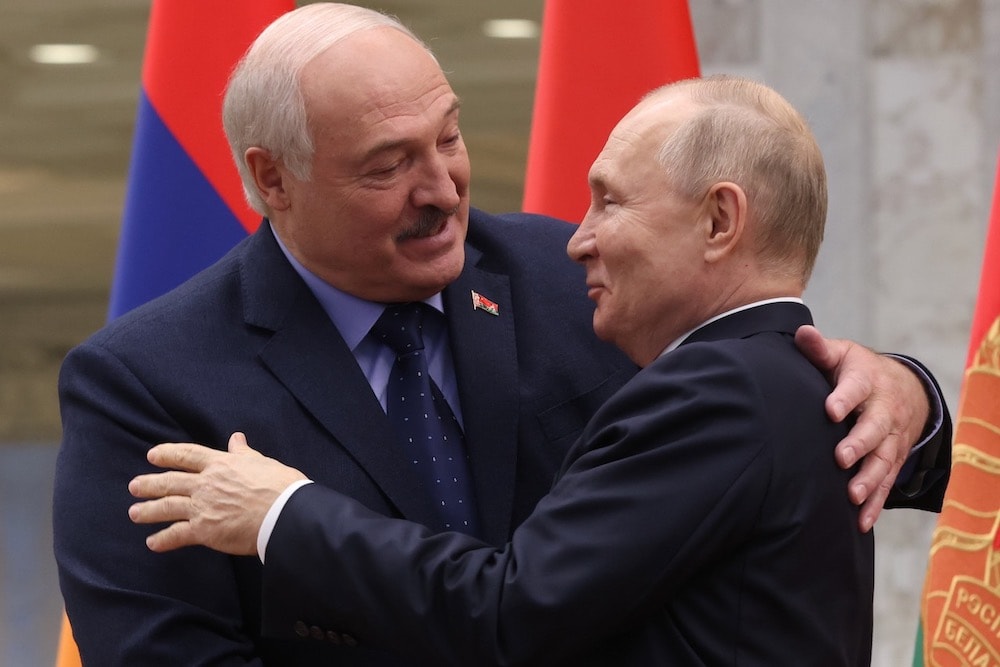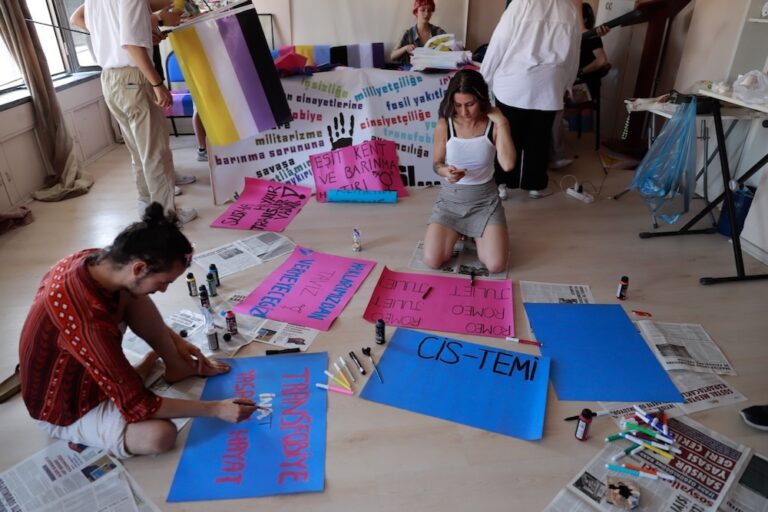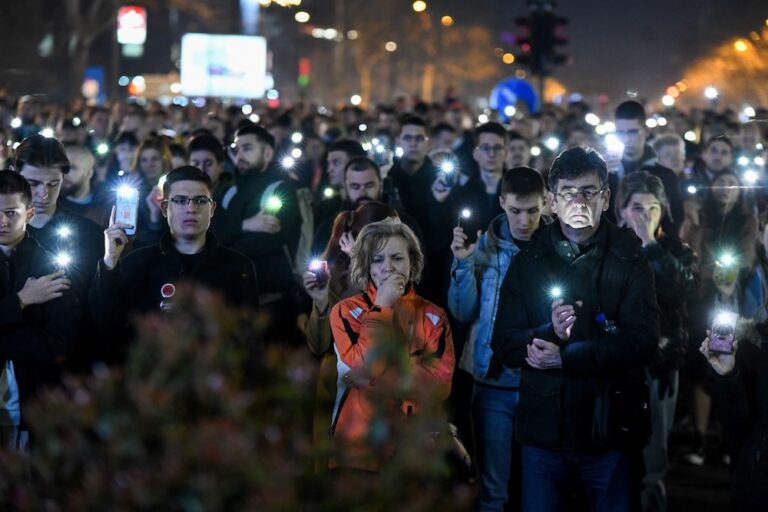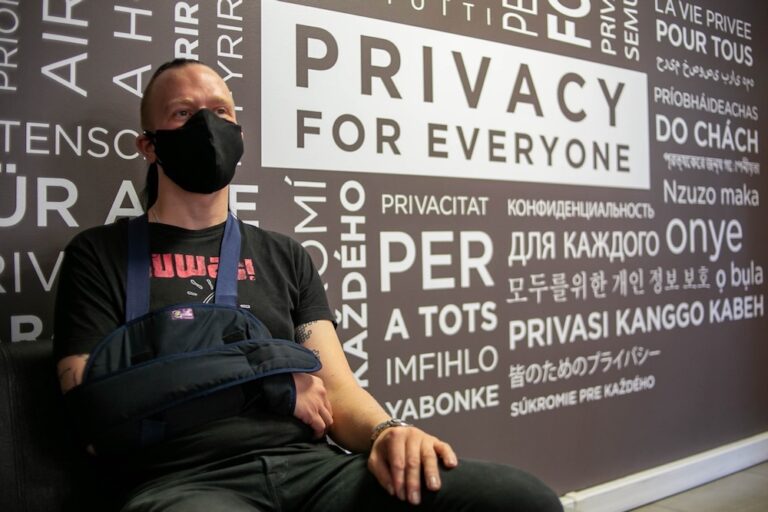IFEX Europe and Central Asia Regional Editor Cathal Sheerin takes a deep dive into what's coming up in Russia and Belarus.
With Russia and Belarus set to hold important elections in the first quarter of 2024, IFEX’s regional editor reflects on the impact that ongoing crackdowns on civic space in both countries will have during the pre-election period and beyond.
Russia: A wartime election
The Russian presidential election is scheduled to take place over 15 – 17 March 2024, with the incumbent, Vladimir Putin, running for another term in office.
When he is re-elected – it would be naïve to say ‘if’ – Putin will continue as president until 2030, having held the office since 2012, and having previously been president from 2000 to 2008. (Putin was prime minister from 1999 to 2000, and from 2008 to 2012.)
Russia’s last presidential election took place in March 2018. OSCE observers described that ballot as “choice without competition”, highlighting “restrictions of fundamental freedoms”, “persistent pressure on civil society” and “the absence of critical reporting in most media”. The lead-up to the vote saw a crackdown on opposition voices, including the arrest of high-profile opposition figure Alexei Navalny (banned from standing for public office himself) after he called for a boycott of the election at an anti-Putin rally in Moscow. A few months later, Navalny would be arrested again, this time during the mass detention of approximately 1,600 people at protests against Putin’s inauguration.
The 2024 presidential election will take place in very different circumstances. The terrible violence that Russia’s ongoing war on Ukraine has inflicted on the Ukrainian people has been accompanied at home by an unprecedented crackdown on civic space, leaving critical voices in a more perilous position than they were at the time of the last presidential election.
Navalny, as we know, is currently serving a prison sentence of over 30 years on several dubious charges. Having recovered from a near-lethal poisoning in 2020, he was arrested and jailed in January 2021. This triggered mass protests across Russia at which police arrested approximately 3,700 people and assaulted 50 journalists. Navalny’s anti-corruption organisation was outlawed as “extremist” in the same year.
In mid-December 2023, Navalny temporarily “disappeared” in the prison system. Following protests by his family, lawyers and the Special Rapporteur on human rights in Russia, it was revealed (after 19 days incommunicado) that he had been moved to a harsh prison above the Arctic Circle in Siberia. Shortly before the move, Navalny’s supporters had launched a campaign to oppose Putin’s re-election in 2024; Navalny himself had issued a statement calling on Russians to vote against Putin.
Several members of Navalny’s circle have been targeted in recent months. In late December 2023, Ksenia Fadeyeva, the former head of Navalny’s regional office in Tomsk, was sentenced to nine years in prison for organising an “extremist” group. In October 2023, in what has been described as a pre-election “purge”, three lawyers representing Navalny – Vadim Kobzev, Igor Sergunin and Alexei Liptser – were arrested on “extremism” charges. They face heavy prison sentences if convicted.
Other opposition leaders have also been removed from the public sphere.
Legislation introduced in 2022 that criminalises “discrediting” or spreading “false information” about the Russian armed forces was used to send opposition politician Vladimir Kara-Murza (like Navalny, a survivor of poisoning) to prison for 25 years in April 2023; Ilya Yashin, another opposition politician, was convicted under the same law in December 2022 and sentenced to 8.5 years in prison.
In late December 2023, the anti-war candidate Yekaterina Duntsova was banned from running in the 2024 election because of “mistakes” on her registration documents.
The final two months of 2023 saw a spate of chilling convictions for “inciting hatred” towards, “discrediting”, or spreading “false information” about the army. Those convicted included leading human rights defender Oleg Orlov, artist-activist Aleksandra Skochilenko, and poets Artyom Kamardin and Yegor Shtovba.
The effects of the war and the speech-restricting legislation that it spawned will be felt throughout the election period and beyond. According to the independent Russian human rights project OVD-Info, by December 2023 there had been nearly 20,000 detentions of Russian citizens who had expressed anti-war views. Such a level of repression could have a dampening effect on opposition protests and rallies in the lead-up to voting day; its impact was certainly seen in 2023 which, as OVD-Info notes, “will not be remembered for large mass protests and thousands of arrests” (in contrast to 2022, for example).
The wholesale persecution of independent media that followed Russia’s invasion of Ukraine will undoubtedly result in even more unbalanced domestic political coverage and an increase in censorship (both self- and state-enforced) during the 2024 election.
Several journalists were targets of this persecution in 2023. Among those behind bars as we begin 2024 are: RusNews’s Maria Ponomarenko, who was sentenced to six years in prison for spreading “false information” about the military; the Wall Street Journal’s Evan Gershkovich, who has been detained on dubious “espionage” charges since May; and Radio Free Europe/Radio Liberty’s Alsu Kurmasheva, who has been in pre-trial detention since October, when she was detained for failing to register as a “foreign agent”, and who has since been charged with spreading “false information” about the military.
Political activism or commentary ahead of March’s presidential election is also likely to be impacted by increased legal restrictions on civil society organisations. In December 2023, a new law expanding Russia’s notorious – and already vast – “foreign agent” legislation came into force. Human Rights Watch (HRW) summarises its drastic implications for the rights to free expression and free assembly:
“The law expands the definition of foreign agent to a point at which almost any person or entity, regardless of nationality or location, who engages in civic activism or even expresses opinions about Russian policies or officials’ conduct could be designated a foreign agent, so long as the authorities claim they are under ‘foreign influence.’ It also excludes ‘foreign agents’ from key aspects of civic life.”
Authoritarian leaders need their scapegoats, especially during elections and wars. In Russia, “foreign agents” and the LGBTQI+ community have been among the chosen targets for over a decade.
In November 2023, Russia’s legislative attack on LGBTQI+ people delivered another serious blow when the Supreme Court ruled that the so-called “international LGBT movement” was an “extremist organisation”. HRW’s Tanya Lokshina described the ruling as an attempt to further “scapegoat” LGBTQI+ people ahead of the 2024 presidential election, and “paralyse” the activities of LGBTQI+ civil society groups and those who work with them. Under Russian criminal law, those who participate in or collaborate with an “extremist organisation” can face heavy prison sentences.
According to the independent Russian polling organisation Levada Center, Putin currently has an approval rating of over 80% in Russia. In 2021, he signed a constitutional amendment allowing him to run for president again in 2030.
Belarus: A serious stress test
Parliamentary elections in Belarus are scheduled for 25 February 2024. They will be the first elections to be held in the country since the August 2020 presidential election that kept Lukashenka in power, triggered a massive wave of popular protest, and launched the ongoing crackdown on the independent press and civil society.
The exiled opposition leader, Sviatlana Tsikhanouskaya, has called on the international community to “reject” the upcoming elections: “With political parties dismantled, leaders jailed or exiled, this is nothing more than a charade,” she tweeted in November.
And it’s not just political parties that have been dismantled. Lukashenka’s “purge” of civil society organisations (CSOs), launched in 2021, has had a devastating effect on civil society. According to the Belarusian human rights group Lawtrend, by September 2023 a jaw-dropping 1,441 CSOs had been dissolved by a court, otherwise de-registered, or opted for voluntary liquidation. Several CSOs have been forced to work in exile.
One of those CSOs ordered to dissolve is the Belarusian Association of Journalists (BAJ). As BAJ reminded us in its recent overview of 2023, Belarus is one of the worst jailers of journalists in the world, with 32 media workers detained behind bars at the turn of the year. Other statistics for 2023 provided by BAJ are equally disturbing: 46 journalists arrested, 33 media outlets (including BAJ) declared “extremist” and 12 media outlets declared “terrorist”.
With so many groups put out of action, with so many journalists, civic activists and others in prison for challenging Lukashenka during the 2020 election or in its aftermath (currently, Belarus has over 1,400 political prisoners), it would be very surprising if February 2024 saw the massive, organised expression of dissent that we saw in 2020.
But that doesn’t mean that the authorities are taking any chances.
In a recent article for openDemocracy, the journalist Igor Ilyash (husband of imprisoned journalist Katsiaryna Andreyeva) describes the upcoming February elections as “a serious stress test” for Lukashenka’s government ahead of the 2025 presidential election. As Ilyash explains, preparations for smothering dissent and ensuring an unfair electoral process are already well underway:
“Belarusian security forces are currently training in how to disperse mass protests and conducting mass searches of members of the opposition Coordination Council. They plan to make the personal data of members of election commissions secret, so that they do not fear being publicly ostracised for participating in election fraud. A ban has been introduced on photographing or filming a completed ballot, after protesters in 2020 used ballot images to try and organise a new vote count. The authorities have refused to set up polling stations abroad, meaning several hundred thousand political emigres will be excluded from the election process. And specifically, as an antidote to the boycott strategy, the election turnout threshold has been eliminated.”
The shock to the Lukashenka regime of the 2020 protests is still reverberating, as is evidenced by the authorities’ continued harassment and persecution of those groups and individuals who did not toe the line. December 2023 saw rights activist Alyaksandra Kasko sentenced to ten years in prison for her involvement in the 2020 demonstrations. It also saw former observers of the 2020 elections subjected to searches and harassment by state agents.
In early January 2024, Lukashenka signed a law giving him immunity from prosecution for life and banning exiled opposition leaders from standing in presidential elections.



